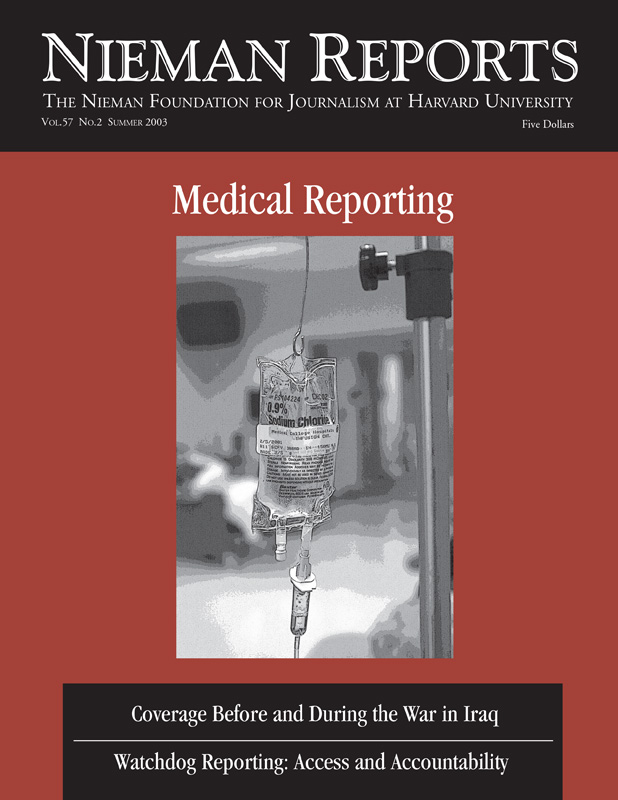“The conflict in Iraq is the first test of a new theory that is a dramatic—I’d say radical—departure from the mainspring of American character. Unilateral or largely unilateral ‘wars of choice’ reverse the way Americans have believed about their power. It is that of the quiet cowboy: Never boastful, ever friendly and helpful, but deadly if provoked. National newspapers and networks, it seems to me, would serve our democracy nobly by testing the validity, value and consequences in blood, reputation and treasure of the first test of the new definition of American power.”
—A message from Anniston (Ala.) Star Chairman and Publisher Brandt Ayers sent to Nieman Reports on March 23, 2003.

“Whether or not the United States wages war on Iraq, this may be the most important question, not just for now but in the future: Does a U.S. President really have the power ‘to make war at his pleasure’? That question is seldom being asked by an American press that seems sometimes to be playing on the administration team rather than pursuing the necessary search for truth, wherever it may lead.”
—Tom Wicker, writing a Guest Opinion column, “Press Isn’t Asking Right Questions,” in Editor & Publisher on March 11, 2003.

“I feel less confident than ever that I understand how we as a nation moved to this point. Too many of my sources of information have let me down. I have never felt as much at sea as I do in this new sea of information.”
—Bill Kovach, chairman of the Committee of Concerned Journalists, quoted in the March 22, 2003 story, “Papers Can Filter the Facts, Fiction” by Tim Rutten of the Los Angeles Times.

“To see that our media, which are supposed to supply us with any information possible, are at the beck and call of our administration’s agenda, infuriates me. I want both sides of the news, not just pro-war images and stories that gloss over the complexities of this situation.”
—From a Letter to the Editor, written by Eleanor Doig, Brunswick, Maine and published in The New York Times on April 1, 2003.

“I am discouraged by reporters’ willingness to swallow most of what is being told to them. How can they keep referring to ‘coalition forces’ as if there were actually some sort of coalition?”
—Todd Gitlin, a professor of journalism and sociology at Columbia University, quoted in a New York Times article on March 31, 2003, “Reporters’ New Battlefield Access Has Its Risks and Rewards,” by David Carr.

“As Mr. Fleischer repeatedly suggested that the answers to questions lay elsewhere, the White House reporters who fancy themselves part of one of the mightiest journalistic corps on the planet realized that once again they were embedded in the wrong unit.”
—David Carr, writing on March 23, 2003 in The New York Times, “Press Secretary Doles Out Answers, but Doesn’t Give Away Much.”

“The [Pentagon] briefing is disguised as a forum for reporters to ask questions of officials, so they can write and broadcast knowledgeable stories about the events of the day. The real purpose is to give the official a chance to manage the news. In an administration that has taken news management to new heights, this is a critical mission.”
—Robert G. Kaiser, writing in an article on March 22, 2003 in The Washington Post, “The Briefing, Rumsfeld’s E Ring Circus.”

“‘The 24-hour-a-day cycle of the cable news stations has been influential in shaping public knowledge of the war, but it is ‘a monster that has to be fed,’” said Philip Seib, Lucius W. Nieman professor of journalism at Marquette University. The briefings help provide content for the networks, but showing them in full ‘is not even journalism, it’s a news organization acting as conveyor belt, which from the Pentagon’s standpoint is splendid. Overall, I think the Pentagon has done a very good job of delivering the message it wants to deliver. I think the news media have done less than a good job of doing journalism.’”
—From Milwaukee Journal Sentinel article, “Pentagon Strategy for Media, Battle Have Traits in Common: Diverse Campaign Carefully Planned” by Alan Borsuk, on April 6, 2003.

“It’s more than justified for us to ask questions. And then you have the Pentagon flaying the media, saying it’s unpatriotic to ask questions. I consider myself a patriot. But when there are questions to be asked, I’m going to ask them.”
—Steve Capus, executive producer of “NBC Nightly News With Tom Brokaw,” quoted in an April 20, 2003 New York Times story, “Spectacular Success or Incomplete Picture?” by Jim Rutenberg and Bill Carter.

“It’s not that I don’t care who wins. I do think it’s important who wins. I’m rooting for the United States against Saddam Hussein. But our job is to stand back from that and try to communicate as best we can what’s really going on. To say that it’s unpatriotic to look at both the pluses and the minuses is simply wrong.”
—Paul Steiger, managing editor of The Wall Street Journal, quoted in an April 20, 2003 Los Angeles Times story, “Media Matters: A Skeptical Journalist Isn’t an Unpatriotic One,” by David Shaw.


